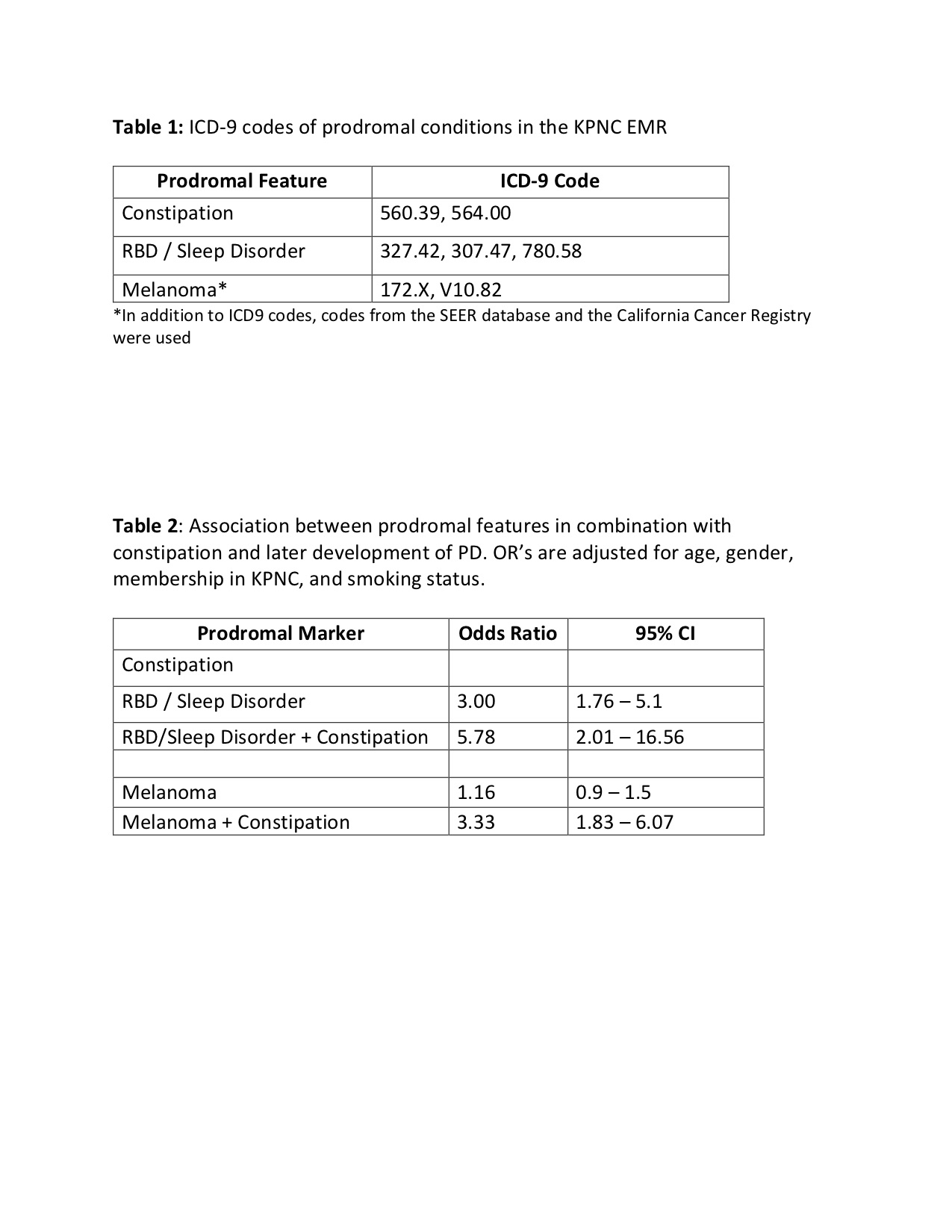Session Information
Date: Tuesday, September 24, 2019
Session Title: Parkinsonisms and Parkinson-Plus
Session Time: 1:45pm-3:15pm
Location: Agora 3 West, Level 3
Objective: To use the electronic medical record (EMR) to understand the independent and joint effects of constipation and other prodromal features on the risk of developing Parkinson’s Disease (PD).
Background: Detection of persons at high risk of PD may facilitate intervention prior to significant neurodegeneration, and would prove useful for clinical trial recruitment and implementation. Constipation is a particularly consistent prodromal feature, associated with subsequent diagnosis of PD when assessed in-person or detected through the EMR [1, 2]. However, constipation is common and has low specificity for PD. Incorporation of additional prodromal features may improve predictive accuracy [3, 4]. We therefore examined joint associations of constipation and other EMR diagnoses consistent with prodromal PD.
Method: Using the Kaiser Permanente Northern California (KPNC) EMR, we identified patients diagnosed with PD by a neurologist between 2004 and 2010. Cases were reviewed and classified by a movement disorder specialist (CMT). Controls were matched 5:1 by age, sex, and duration of KPNC membership. Diagnoses of constipation and other prodromal features were determined from ICD9 codes in the EMR prior to PD diagnosis (see Table 1). We used logistic regression to calculate odds ratios (ORs) adjusted for matching factors and smoking. We also conducted lagged analyses that only included prodromal diagnoses occurring 5 years or more before PD diagnosis.
Results: A total of 2717 cases and 13585 matched controls were identified. Demographic features were as expected from a PD cohort, with 59.3 % male and mean age at diagnosis of 73.6 (SD 9.9) years old. The risk (odds ratio, OR) of PD after a diagnosis of constipation was 2.79 (95% CI 2.47 – 3.15). The risk of developing PD increased when constipation was combined with certain diagnoses of other prodromal features, including REM Sleep Behavior Disorder (RBD) / other sleep disorder or melanoma (Table 2).
Conclusion: As expected, a diagnosis of constipation was associated with increased risk of subsequent PD. Risk was markedly increased in combination with a diagnosis of sleep disorder or melanoma. Combinations of select EMR diagnoses may help to identify prodromal PD with greater accuracy than any individual feature, but relationships are complex.
References: 1. Abbott RD, Petrovitch H, White LR, Masaki KH, Tanner CM, Curb JD, Grandinetti A, Blanchette PL, Popper JS, Ross GW: Frequency of bowel movements and the future risk of Parkinson’s disease. Neurology 2001(57):456–462. 2. Savica R, Carlin JM, Grossardt BR, Bower JH, Ahlskog JE, Maraganore DM, Bharucha AE, Rocca WA: Medical records documentation of constipation preceding Parkinson disease: A case-control study. Neurology 2009, 73(21):1752-1758. 3. Berg D, Postuma RB, Adler CH, Bloem BR, Chan P, Dubois B, Gasser T, Goetz CG, Halliday G, Joseph L et al: MDS research criteria for prodromal Parkinson’s disease. Mov Disord 2015, 30(12):1600-1611. 4. Schrag A, Anastasiou Z, Ambler G, Noyce A, Walters K: Predicting diagnosis of Parkinson’s disease: A risk algorithm based on primary care presentations. Mov Disord 2019.
To cite this abstract in AMA style:
E. Brown, S. Goldman, K. Albers, S. Vanden Eeden, C. Tanner. Constipation with selected prodromal features increases risk of subsequent Parkinson’s Disease [abstract]. Mov Disord. 2019; 34 (suppl 2). https://www.mdsabstracts.org/abstract/constipation-with-selected-prodromal-features-increases-risk-of-subsequent-parkinsons-disease/. Accessed December 26, 2025.« Back to 2019 International Congress
MDS Abstracts - https://www.mdsabstracts.org/abstract/constipation-with-selected-prodromal-features-increases-risk-of-subsequent-parkinsons-disease/

